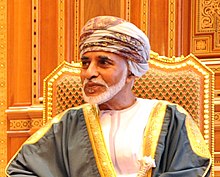Qaboos
| Qaboos bin Said Al Said | |
|---|---|
 |
|
| Sultan of Oman | |
| Reign | 23 July 1970 – present |
| Predecessor | Said bin Taimur |
| Born |
18 November 1940 Salalah, Oman |
| Spouse | Sayyida Nawwal bint Tariq (1976–1979) |
| House | Al Said |
| Father | Said bin Taimur |
| Mother | Mazoon al-Mashani |
| Religion | Ibadi Islam |
|
Styles of The Sultan of Oman |
|
|---|---|
 |
|
| Reference style | His Majesty |
| Spoken style | Your Majesty |
| Alternative style | Sire |
Qaboos bin Said Al Said (Arabic: قابوس بن سعيد آل سعيد, IPA: [ˈqaːbuːs bɪn ˈsaʕiːd ʔaːl ˈsaʕiːd]; born 18 November 1940) is the Sultan of Oman. He rose to power after overthrowing his father, Said bin Taimur, in a palace coup in 1970. He is the 14th-generation descendant of the founder of the Al Bu Sa'idi dynasty. He is the longest serving Arab leader having held the office since 1970.
Qaboos was born in Salalah in Dhofar on 18 November 1940. He is the only son of Sultan Said bin Taimur and Sheikha Mazoon al-Mashani.
He received his primary and secondary education at Salalah and Pune, India where he was the student of Shankar Dayal Sharma, the former President of India and was sent to a private educational establishment in England at age 16. At 20, he entered the Royal Military Academy Sandhurst. After graduating from Sandhurst in September 1962, he joined the British Army and was posted to the 1st Battalion The Cameronians (Scottish Rifles), serving with them in Germany for one year. He also held a staff appointment with the British Army.
After his military service, Qaboos studied local government subjects in England and then completed his education with a world tour chaperoned by Leslie Chauncy. Upon his return in 1966, he was placed under virtual house arrest in the Sultan's palace in Salalah by his father. Here he was kept isolated from government affairs, except for occasional briefings by his father's personal advisers. Qaboos studied Islam and the history of his country. His personal relationships were limited to a handpicked group of palace officials who were sons of his father's advisors and a few expatriate friends such as Tim Landon. Sultan Said said that he would not allow his son to be involved with the developing planning process, and Qaboos began to make known his desire for change — which was quietly supported by his expatriate visitors.
...
Wikipedia
